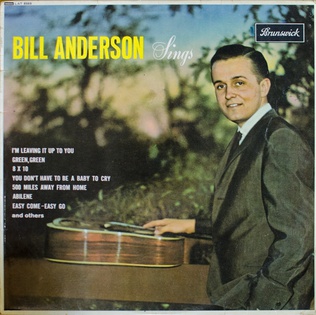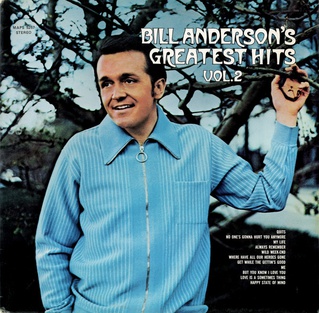Related Research Articles
"Quits" is a song written and recorded by American country singer-songwriter Bill Anderson. It was released as a single in 1971 via Decca Records and became a major hit the same year.

Bill Anderson Sings is a studio album by American country singer-songwriter Bill Anderson. It was released in February 1964 on Decca Records and was produced by Owen Bradley. The album was Anderson's second studio release as a recording artist and included two singles that became major hits on the Billboard country chart. The album itself would also reach positions on the Billboard charts following its release.

I Love You Drops is a studio album by American country singer-songwriter Bill Anderson. It was released in August 1966 on Decca Records and was produced by Owen Bradley. It was Anderson's fifth studio release and included three singles that became major hits on the Billboard country chart. The album would also become a success on the Billboard country albums list upon its release, becoming one of his most successful charting albums.

Bill Anderson's Greatest Hits, Vol. 2 is a compilation album by American country singer-songwriter Bill Anderson. It was released in September 1971 on Decca Records and was produced by Owen Bradley. The record was Anderson's fourth compilation released in his recording career and contained one single that became a major hit in 1971. The album itself included some his biggest hits from the era.
"That's What It's Like to Be Lonesome" is a song written and recorded by American country singer-songwriter Bill Anderson. It was released as a single in December 1958 via Decca Records and became a major hit. A similar version was released by American country artist Ray Price the same year via Columbia Records.
"Ninety-Nine" is a song written and recorded by American country singer-songwriter Bill Anderson. It was released as a single in June 1959 via Decca Records and became a major hit.
"Walk Out Backwards" is a song written and recorded by American country singer-songwriter Bill Anderson. It was released as a single in October 1960 via Decca Records and became a major hit.

"Po' Folks" is a song written and recorded by American country singer-songwriter Bill Anderson. It was released as a single in June 1961 via Decca Records and became a major hit.
"8×10" is a song written by Bill Anderson and Walter Haynes. It was first recorded by American country singer-songwriter Bill Anderson. It was released as a single in 1963 via Decca Records and became a major hit.
"Five Little Fingers" is a song written and first recorded by American country singer-songwriter Bill Anderson. It was released as a single in 1963 via Decca Records and became a major hit.
"Me" is a song written by Alex Zanetis that was first recorded by American country singer-songwriter Bill Anderson. It was released as a single in 1964 via Decca Records and became a major hit.
"Three A.M." is a song written by Bill Anderson and Jerry Todd. It was first recorded by its co-writer, Bill Anderson. It was released as a single in 1964 via Decca Records and became a major hit.
"Certain" is a song written and first recorded by American country singer-songwriter Bill Anderson. It was released as a single in 1965 via Decca Records and became a major hit.
"Bright Lights and Country Music" is a song written and first recorded by American country singer-songwriter Bill Anderson. The track was also co-written with Jimmy Gateley. It was released as a single in 1965 via Decca Records and became a major hit.
"Get While the Gettin's Good" is a song written by Ted Cooper and Steve Karliski. It was first recorded by American country singer-songwriter Bill Anderson. It was released as a single in 1967 via Decca Records and became a major hit.
"Love Is a Sometimes Thing" is a song written by Jan Howard. It was first recorded by American country singer-songwriter Bill Anderson. It was released as a single in 1970 via Decca Records and became a major hit the same year.
"Always Remember" is a song written by Jerry Bradley and Patsy Lawley. It was first recorded by American country singer-songwriter Bill Anderson. It was released as a single in 1971 via Decca Records and became a major hit the same year.
"All the Lonely Women in the World" is a song written and recorded by American country singer-songwriter Bill Anderson. It was released as a single in 1972 via Decca Records and became a major hit the same year.
"Easy Come – Easy Go" is a song written and first recorded by American country singer-songwriter Bill Anderson. It was released as a single in 1963 via Decca Records and became a major hit.
"Golden Guitar" is a song written by Billy Gray and Curtis Leach. It was first recorded by American country singer-songwriter Bill Anderson. It was released as a single in 1965 via Decca Records and became a major hit.
References
- 1 2 "Bill Anderson -- "Dead or Alive" (1959, Vinyl)". Discogs . Retrieved 21 July 2020.
- ↑ Whitburn, Joel (2008). Hot Country Songs 1944 to 2008. Record Research, Inc. ISBN 978-0-89820-177-2.
- ↑ ""Dead or Alive" chart history". Billboard . Retrieved 21 July 2020.
- ↑ "Bill Anderson Chart History (Hot Country Songs)". Billboard. Retrieved July 21, 2020.